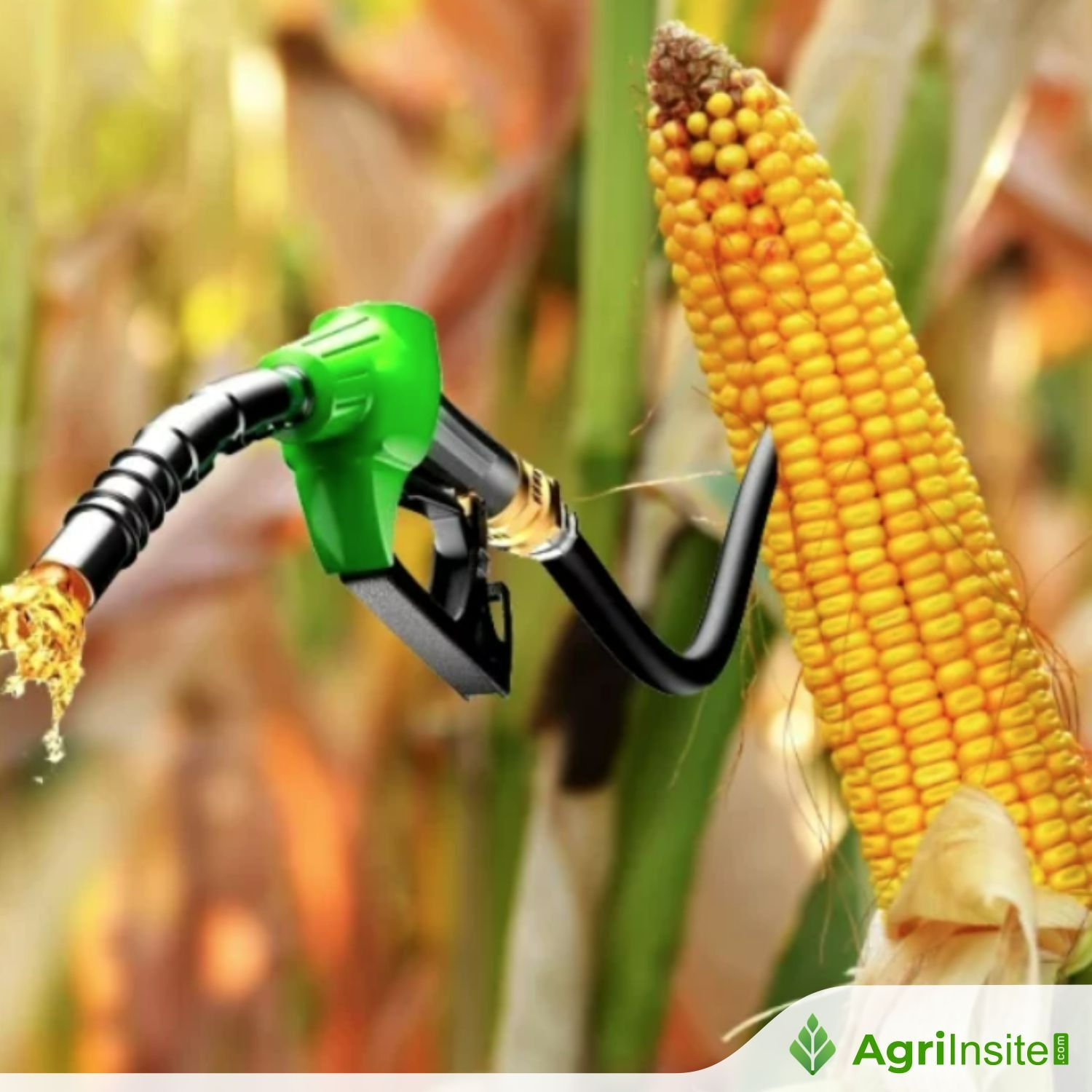Dent Corn Revolution

Dent corn, a non-edible variety, is used as feedstock for bioethanol in over 200 U.S. biorefineries. It produces high ethanol yields due to its starch content and offers valuable by-products like corn oil and protein meal. India should promote a “Dent Corn Revolution” to improve energy security, reduce crude oil imports, and boost farmer income through ethanol production.
Dent Corn is a non-edible variety of corn used as a feedstock to produce bioethanol. All the bioethanol and animal protein produced in USA in over 200 biorefineries is from dent corn, which makes up 95 per cent of the corn grown (about 400 million ton/year) in the country. Dent Corn with 70-75 per cent starch content is particularly advantageous for production of valuable by-products (protein meal and corn oil) and the starch residue and ingrained cellulosic fibre is converted to ethanol.
This higher starch content results in much greater ethanol yield, producing 425-450 litres per ton. Dent Corn is the most produced crop globally with 1.2 billion tons/year, followed by wheat and rice at about 760 million tons each. India is an agriculture-focused society leading in wheat, excessive water-requiring rice and sugarcane crops. India also leads in milk production with high protein requirements of dairy cows. However, it is unfortunate that fastgrowing dent corn with good protein content has not received attention of the Indian community, farmers in particular, despite the distinct advantages of corn for ethanol, protein meal and corn oil (cooking) production.
Ethanol offers a complete solution for our country’s energy security. Ethanol can fully replace gasoline in automobiles with flex engines. It is also used to produce Synthetic Aviation Fuel and can be a replacement for LPG in household cooking. Ethanol is also a feedstock to produce bio-ethylene and ethylene derivatives for the vast petrochemical industry, reducing carbon emissions significantly towards net zero, and at a fraction of capital investment cost for similar sized Naphtha or Gas steam crackers, including specialty chemicals and hydrogen. Ethanol contributes to a reduction of around 80 per cent in Greenhouse gas emissions compared to fossil fuels. In production of ethylene, about 3-ton carbon/ ton is saved compared to Naphtha or Ethane cracker.
The use of dent corn for ethanol production will free up broken rice, grains, sugarcane juice, even molasses, etc., which are now being used for ethanol production, and ensure food security. Also, ethanol production from dent corn will offer corn oil, animal proteins, and DGCA for animal feed which are being imported in the country besides growing industrial ethanol import. (about 2 million tons/year recently). The increasing demand for ethanol will lead to better remuneration to farmers, thereby improving their socio-economic condition. Dent Corn is a fuel and should have parity with crude oil. Unfortunately, India has remained misguided, confusing dent corn with food grain corn. Edible corn is being taken care of by the Agriculture Ministry with a focus on increasing its cultivation. The need of the hour is to lead a “Dent Corn Revolution” for fuel purposes.
This is not our expertise, but we can seek support from the USA and Brazil. Both US and Brazil are leaders in corn and corn-based ethanol production. The government should allow, for a limited period of 5-10 years, the import of dent corn with zero duty to enable the establishment of large ethanol biorefineries in the country. By doing so, the requirement for bioethanol will be locally met, and the demand for dent corn will increase exponentially, giving farmers an incentive to lead a “Dent Corn Revolution.” This will reduce import costs of crude oil and LNG import and thus will give net forex saving while reducing the drain on Indian reserves. On 18 September, the US and India joined hands on a SAF development alliance during the visit of Petroleum Minister Hardeep Puri to US energy secretary Jennifer Granholm.
Dent Corn provides a robust supply chain for production of SAF in India and its use to decarbonize the rapidly growing aviation sector. This is in continuation of the G-20 Biofuels alliance launched by India on 10 September 2023. Etha nol and Ethylene are preferred pathways to SAF production. A comparative analysis with the United States, a global leader and now Brazil in corn-to-ethanol production, underscores the importance of robust government support and incentives in the beginning to enable realizing this potential. The United States has become a leading producer of corn-based ethanol due to extensive federal support, including the Renewable Fuel Standard (RFS) that mandates renewable fuel use in transportation.
Enforced laws requiring ethanol blending, tax credits, grants, and loan guarantees have spurred investment in ethanol production, reducing financial risks for investors. California does E85 and in Brazil it is E100 for flex cars. The production of bioethanol in the United States over the past three years has shown a steady increase in fuel grade bioethanol production. In 2021, it was 45 million tons; in 2022 46.5 million tons and in 2023: 47.5 million tons (against an installed capacity of 55 million ton/year) The American corn-to-ethanol industry has created flourishing farmlands, millions of farming and other industry jobs and provided farmers with a stable market, boosting rural economic development and the circular economy.
It has also diversified energy supply, reducing reliance on imported oil, and enhanced energy security. This also reduces carbon imbalance as increased corn crop would absorb higher amount of Co2 from atmosphere. The United States is the world’s largest producer and exporter of corn. About 50 millions /year is exported globally. Brazil, Argentina, and Ukraine are other corn exporters. A huge portion of the corn harvested in the U.S., EU and now Brazil is used for ethanol production. To achieve a “Dent Corn Revolution”, the following policy recommendations are offered:
* Allow duty free import of fuel-grade dent corn. Allow ethanol imports from USA, Brazil, Argentina, Ukraine, and other countries, for a period of five years, for those companies that are keen on setting up bio-refineries in India. The duty-free import of non-food grade dent corn must be kept at par with duty free petroleum imports for 5 years. Corn import will cut down petroleum imports in a big way and provide better economics as well as an environmental solution and less dependence on OPEC.
* Policy enactment to help farmers double the Corn productivity in India in the next 5 years.
* India’s current corn production yield is around 3.5 tons per hectare against 8-15 tons/hectare in USA, EU/ Brazil/Argentina. * Enormous potential to double the crop with better seeds.
* Corn harvesting requires much less water than sugarcane of rice (water is getting scarce) and it can be grown partly in unirrigated land. On bioethanol, the following is recommended .
* 100% replacement of gasoline in flex-fuel engines (E-100), feed for SAF (sustainable aviation Fuel), and replacement of LPG.
* In the US, 95 per cent of bioethanol is produced in 200 large Biorefineries, from dent corn grown as energy / animal feed crop.
* Agriculture Research Institute and other Maize R&D centres should be empowered to lead India in the ‘Dent Corn Revolution’ by 2030, working closely with US agencies, which are far ahead.
* Major and low-cost solution to produce Ethylene for entire petrochemical ethylene derivative chain such as Polyethylene, PVC, EO/MEG/PET, Polycarbonate, PS, and others, The government should work towards creating a Bharat Prakriti (Indhan biofuels) Corporation. This would be a corporation with participation of PSUs and Petroleum sector companies, large private companies, and State-owned companies, who will be responsible to build and operate large ethanol biorefineries to produce Ethanol, Ethylene, and derivatives such as SAF and other Chemicals and polymers.
The mission would be to install global scale biorefineries in the range of 1000 KLPD to 1500 KLPD. India would need 50-100 such global scale projects in the next 10-15 years to meet its biofuel mandates and achieve E-100 for Petrol vehicles, blending in Diesel, SAF, bio-Chemical and bio-polymer production for consumer industry. Participation on selected basis, of USA based pioneering companies that can bring efficient technology solution collaborating with Indian companies in Ethanol, Ethylene, derivatives and SAF production, could be allowed.
Dent Corn Revolution and Bioethanol refineries including SAF should be taken on mission mode with massive government incentives and investment with PLI schemes. ‘Dent Corn Ethanol’ and bioethanol production need a massive incentive, matching that for Green Hydrogen. ‘Yellow Dent Corn Ethanol’ embodies the four Fs: Food, Feed, Fuel and Financial security. It represents a technologically proven and economically competitive pathway for India’s decarbonization and sustainable development. This initiative is a gold mine for both energy and food security and will be a game changer for the nation, ushering in a ‘Yellow Dent Corn Revolution’ for India.
Ethylene produced via Ethanol at a fraction of fossil-based investment will provide the base of the modern Petrochemical industry which utilizes capital intensive and polluting Naphtha and Gas stream crackers. In five years, with these policies and duty free import of dent corn and by empowering farmers, India would have enough domestic dent corn production to reduce/or eliminate import. Corn is currently in OGL, and duty should be eliminated. There is little chance of domestic crude oil, LNG (Petroleum) production to match demand even in the next 100 years. Import dependency and the dollar will continue and grow if biofuels are not addressed with utmost seriousness.
Source Link : https://www.thestatesman.com/opinion/dent-corn-revolution-1503351181.html















